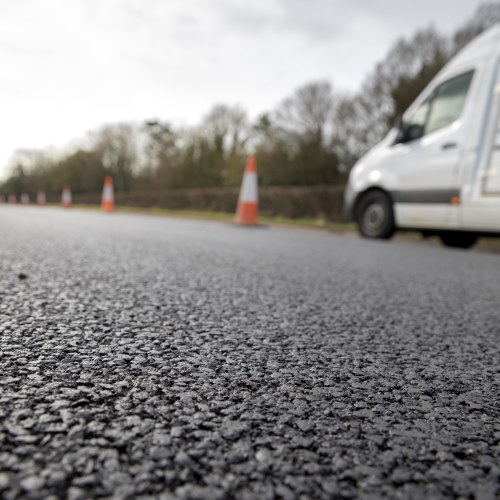RUBBER MODIFIED ASPHALT
Turning old tyres into new roads and reducing carbon emissions
A426, Leicester Road, Blaby Bypass, Leicestershire

Client
Leicestershire County Council
Contractor
Aggregate Industries
Location type
Bypass, Leicestershire
Completion
March 2021
The challenge
Resurfacing was required on this busy dual carriageway from the Leicester Road roundabout at Blaby to the Wychwood roundabout at Whetstone. Finance for the project was part of a successful £5 million Local Highways Maintenance Challenge Fund Bid awarded by the Department for Transport. Among the conditions of winning the funding, were the need to demonstrate the positive economic, environmental and social impacts of the work. As a result, the Council had worked with Tarmac to explore more sustainable alternatives to conventional asphalt materials that would help to reduce the carbon footprint of this scheme. The Council were also keen to minimise disruption to local road users and the works had a strict two-month programme window as stated in a letter addressed to local residents. As work was scheduled for February, winter weather conditions would add a further challenge to meeting this deadline.
Our solution
After discussions with the client, Tarmac recommended their innovative Rubber Modified Asphalt as a 10mm SMA surface course. It incorporates recycled rubber from old tyres and uses warm mix asphalt technology, giving a lower carbon footprint, typically 8% lower than the equivalent conventional SMA. The use of recycled rubber crumb in the mix helps to avoid export of waste car tyres that cannot be recycled in the UK: approximately 500 tyres per kilometre of road, depending on layer thickness. Warm mix asphalts also offer proven gains in productivity, requiring less time to reach trafficking temperatures and allowing more work to be completed within a given operating window along with excellent workability, even in lower seasonal temperatures. Using this innovative solution helped the client to meet the terms of their funding, delivering reductions in carbon emissions and waste, along with a positive social and economic impact from fast, efficient completion of the resurfacing work and minimising disruption for local road users.
Results and benefits
To date, this is the single largest scheme in the UK to use Rubber Modified Asphalt with 4800 tonnes of material supplied from Tarmac’s local Mountsorrel plant. It has enabled the rubber from around 3500 tyres to be recycled on this scheme alone. The carbon footprint was 8.12% lower from using Rubber Modified Asphalt than a standard SMA, saving over 14 tonnes of C02. This is the equivalent to the emissions generated by cars travelling an estimated 116,000 kilometres*. Using Rubber Modified Asphalt was a key part of the Council’s successful Challenge Fund bid and also helped contribute to their Climate Emergency Strategy.
